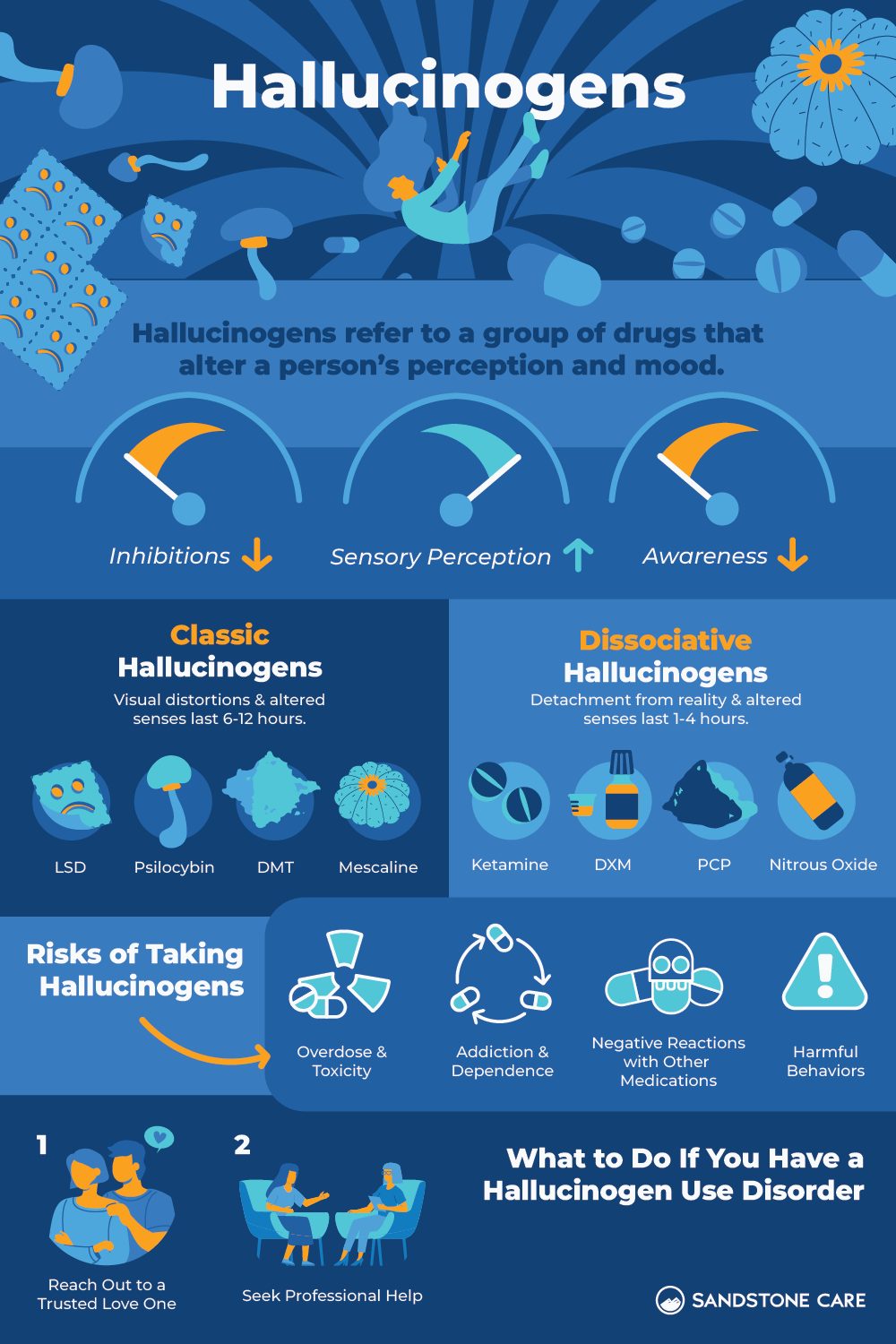Hallucinogens Definition
What Are Hallucinogens?
Hallucinogens refer to a group of drugs that alter a person’s perception and mood.
They can be found in plants or fungi, or they can be produced synthetically.
Hallucinogens, also called psychedelics, can impact a person’s awareness of their own thoughts, feelings, and environment.
Common hallucinogens include ayahuasca, DMT, LSD, Peyote, and psilocybin. These tend to cause auditory or visual hallucinations.
Some hallucinogens also cause users to feel out of control or disconnected from their body and environment. These are often referred to as “disassociates”. Common examples include dextromethorphan (DXM), Ketamine (K, Special K), Phencyclidine (PCP), and Salvia.
Hallucinogens are often thought of as a “club drug.” They are taken recreationally to heighten a person’s sensory perception and decrease inhibitions. However, hallucinogens can come with serious and harmful risks and can potentially lead to addiction.
The use of hallucinogens has significantly increased over the years, especially among young adults ages 19 to 30 who are at risk of taking high doses.
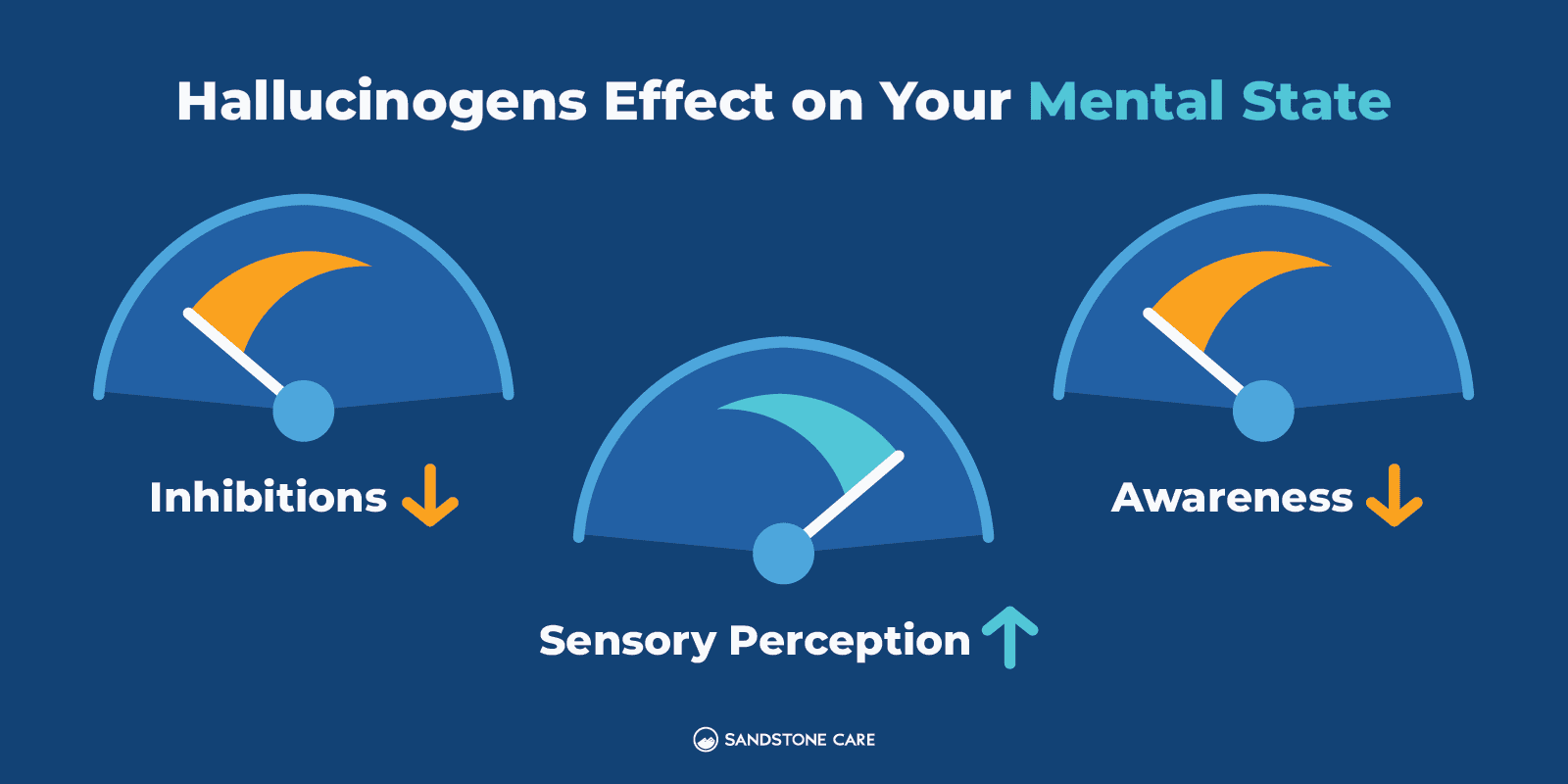
What Is Another Name for Hallucinogens?
Common street names for different types of hallucinogens can include:
- Acid
- Blotter
- Fry
- Mind candy
- Mushrooms
- Shrooms
- Angel Dust
- Special K
- X
- XTC
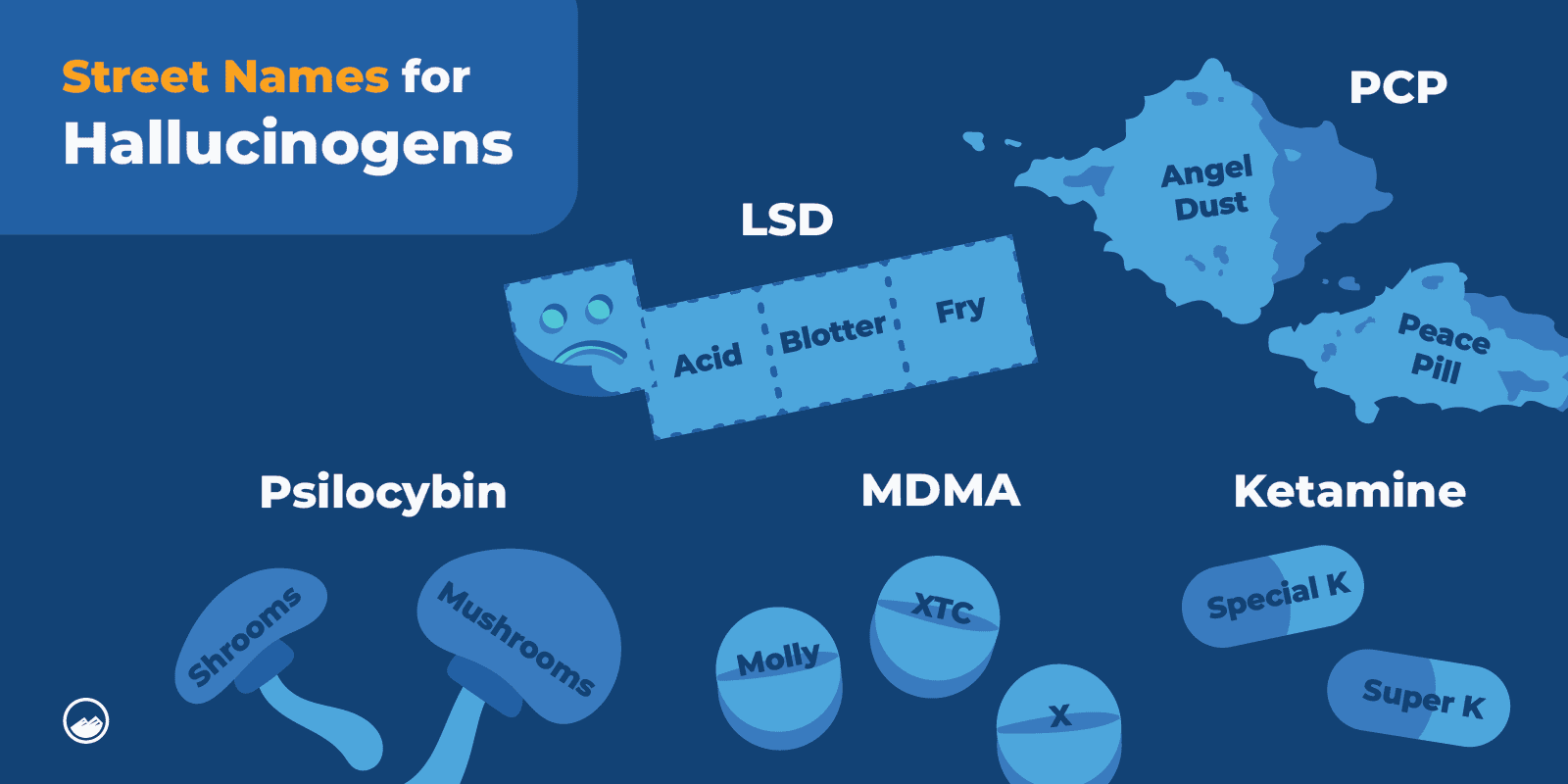
How Are Hallucinogens Taken?
Hallucinogens can come in a variety of different forms but are most often taken orally or smoked.
MDMA or ecstasy tablets are taken by mouth and come in various colors with graphics that appeal to young people.
LSD is sold on blotter paper that is placed on the mouth and absorbed.
What Do Hallucinogens Do?
Hallucinogens cause distorted perceptions and can change how a person hears, thinks, feels, sees, or smells things.
They can alter a person’s perception of reality and make it hard to determine what is real and what is not. These distortions can worsen existing mental disorders and cause an array of harmful side effects.
Hallucinogens and Serotonin
The brain chemical serotonin, regulates:
- Mood
- Sensory perception
- Sleep
- Hunger
- Body temperature
- Sexual behavior
- Muscle control
Hallucinogens and Glutamate
The brain chemical glutamate regulates:
- Pain perception
- Responses to the environment
- Emotion
- Learning and memory
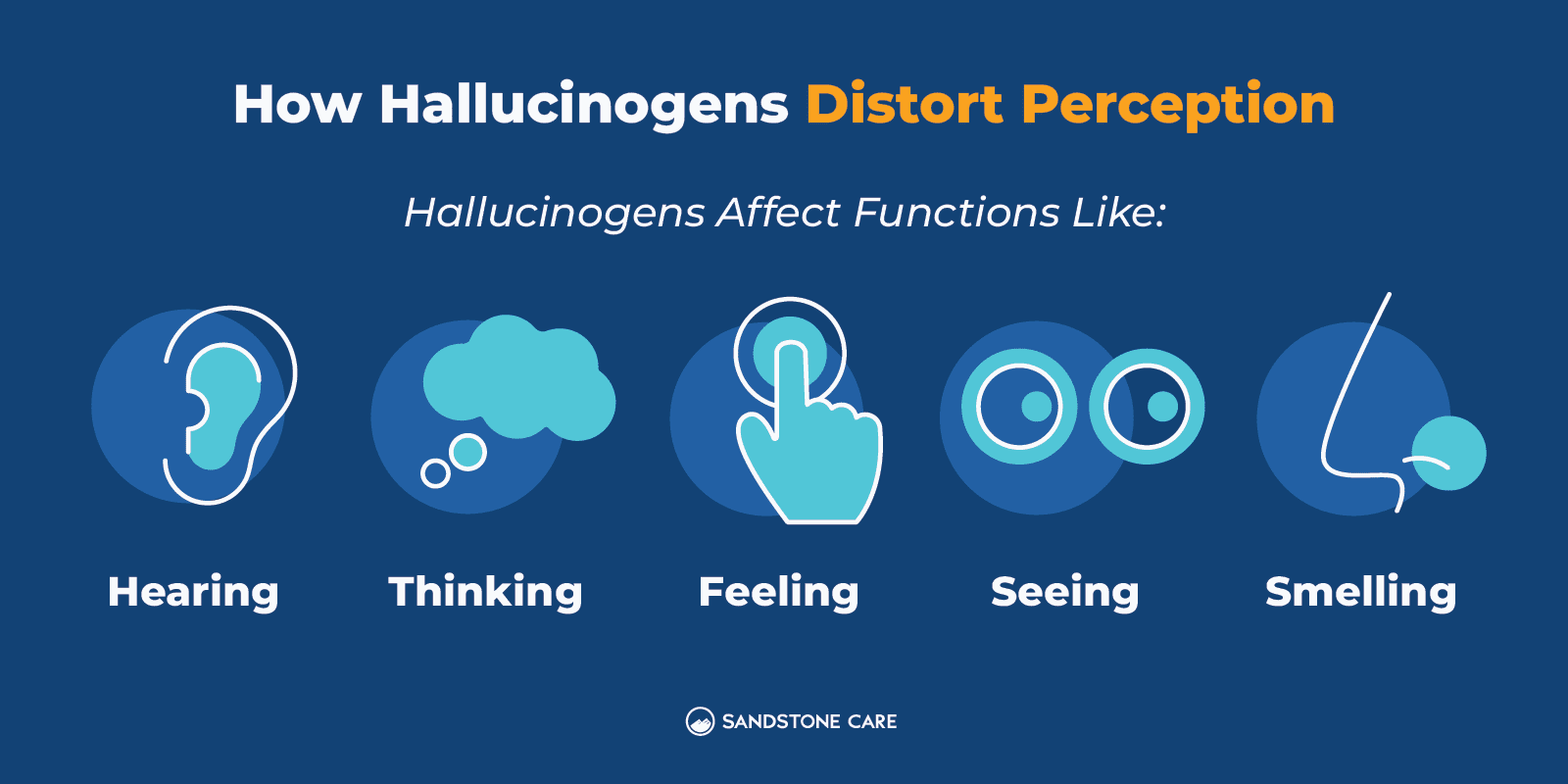
How Do Hallucinogens Work?
Hallucinogens disrupt how neurotransmitters work in the brain and can impact activity in the brain.
Different hallucinogens, such as ayahuasca or cannabis, can impact the brain in slightly different ways depending on what their active ingredients are. However, all of them are known for their psychedelic effects.
Are Hallucinogens Addictive?
Some hallucinogens are not considered to be highly addictive. However, they still have the potential for psychological addiction.
Hallucinogens can also lead to the development of cravings, tolerance, and dependence.
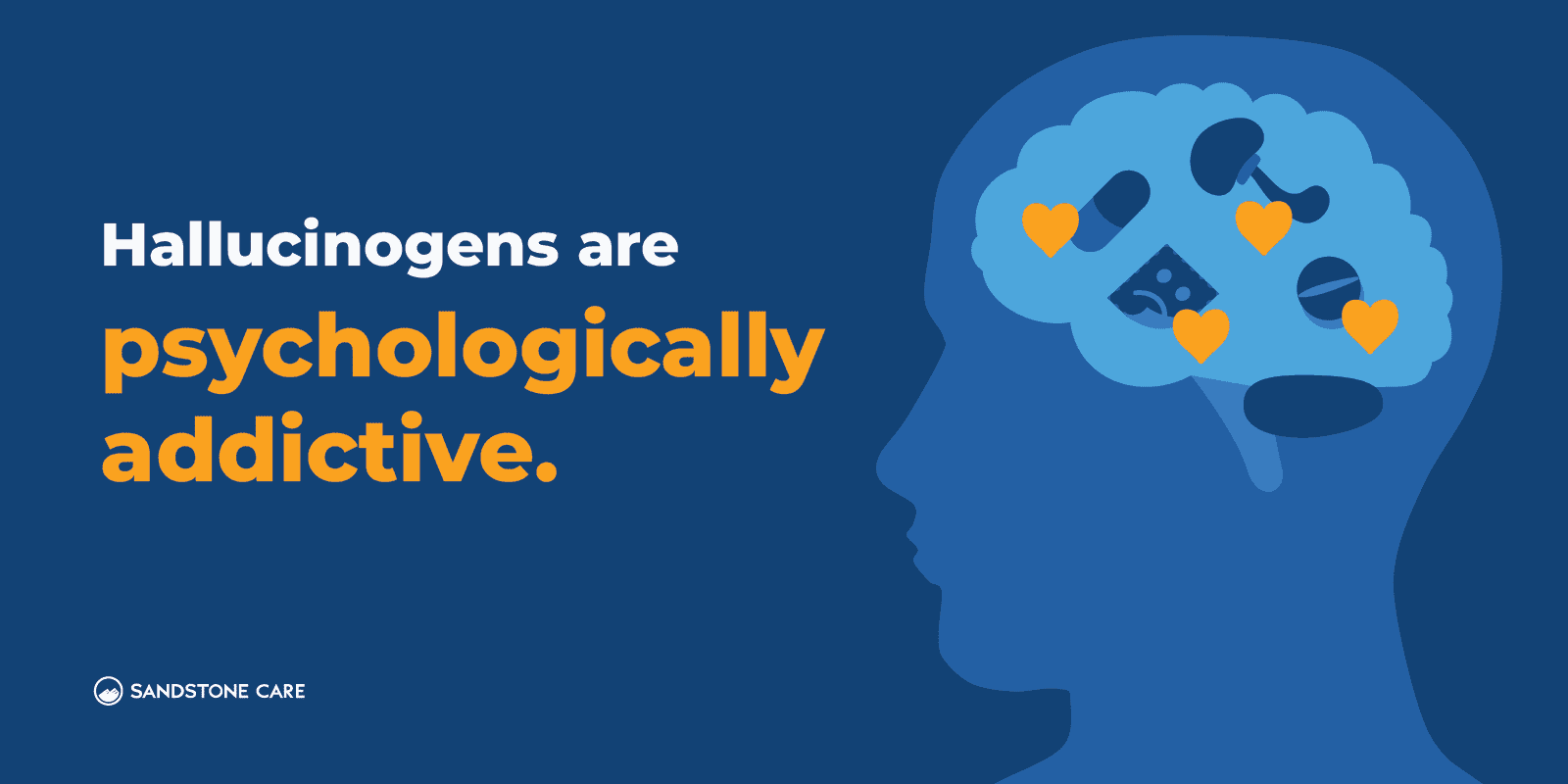
History & Use of Hallucinogens
How Common Is Hallucinogen Use?
According to a news release from the National Institute on Drug Abuse, “Marijuana and hallucinogen use among young adults reached an all-time high in 2021”.
Research shows a significant increase in marijuana and hallucinogen use among individuals ages 19-30 in the U.S.
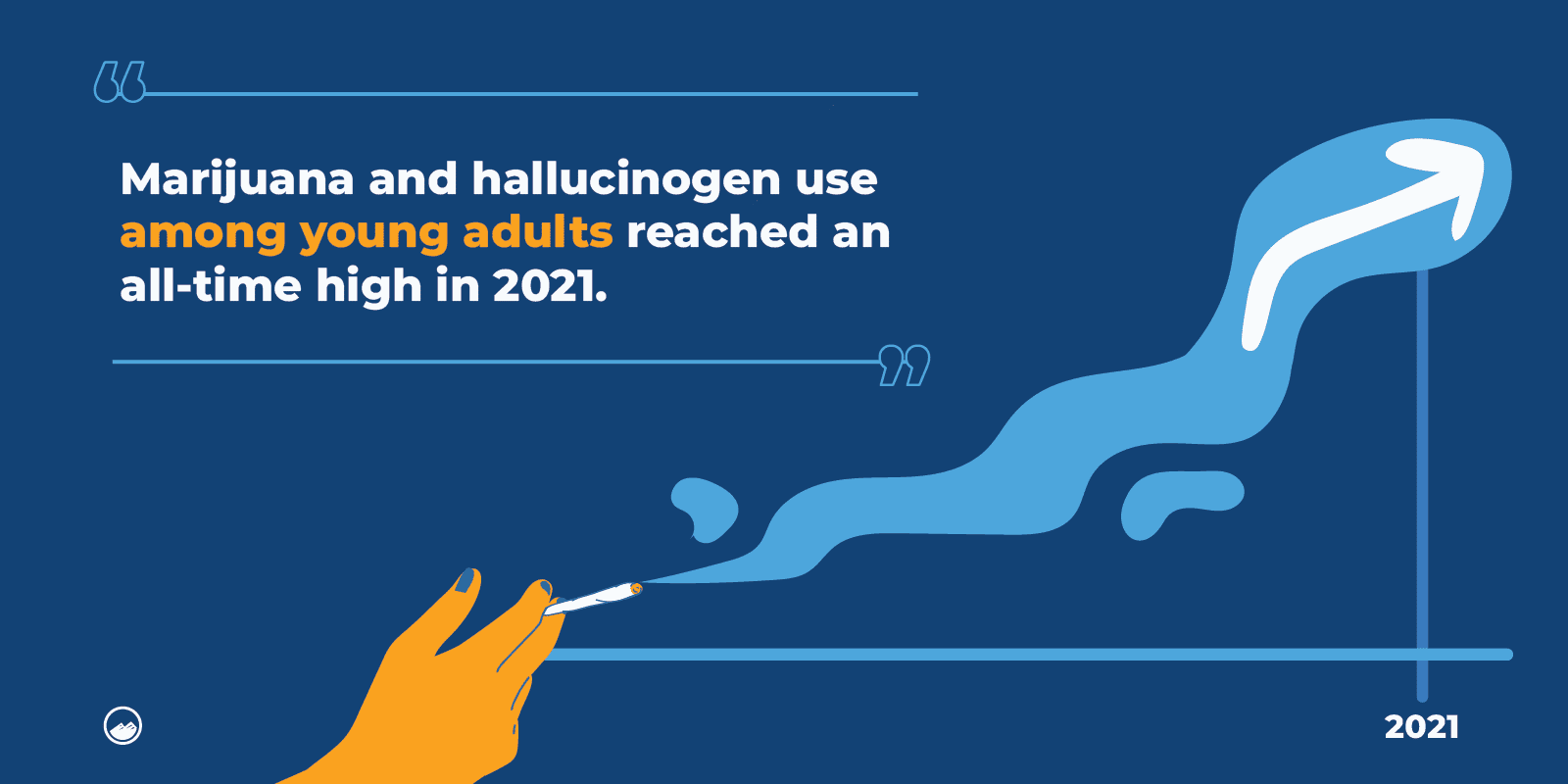
Who Discovered the First Psychedelic?
Albert Hoffman first synthesized the psychedelic lysergic acid diethylamide (LSD) in 1938 and was the first person to ingest LSD.
However, hallucinogens have had a variety of uses throughout much of human history. In many cultures, such as indigenous and Native American communities, hallucinogens have spiritual significance.
What Was the Psychedelic Drug Movement 1960S?
The 1960s were a time when psychedelic drug use was on the rise.
Pop culture was heavily influenced by hallucinogens like LSD, peyote, and psilocybin.
It wasn’t until the mid-1970s that the psychedelic drug movement and research slowed down because of its association with counterculture activities, methamphetamine addictions, drug abuse, and other negative results.
What Tribes Had Hallucinogens?
Many pre-Columbian Mesoamerican cultures used hallucinogens for magical, therapeutic, or religious purposes.
Hallucinogens were used to alter the state of consciousness to heal in both ritual and religious ceremonies.
The Aztecs, Olmecs, Zapotec, and Mayans used peyote, hallucinogenic mushrooms, and the seeds of ololiuhqui, which contain mescaline, psilocybin, and LSD.
Many modern indigenous communities still consider hallucinogens a part of their spiritual practice. For example, ayahuasca is used in Quechua communities in South America as a means of connecting with different planes.
Are Hallucinogens Legal?
Many hallucinogenic drugs are considered Schedule I controlled substances under the Drug Enforcement Administration, meaning they have a high potential for abuse and no currently accepted medical use in the United States.
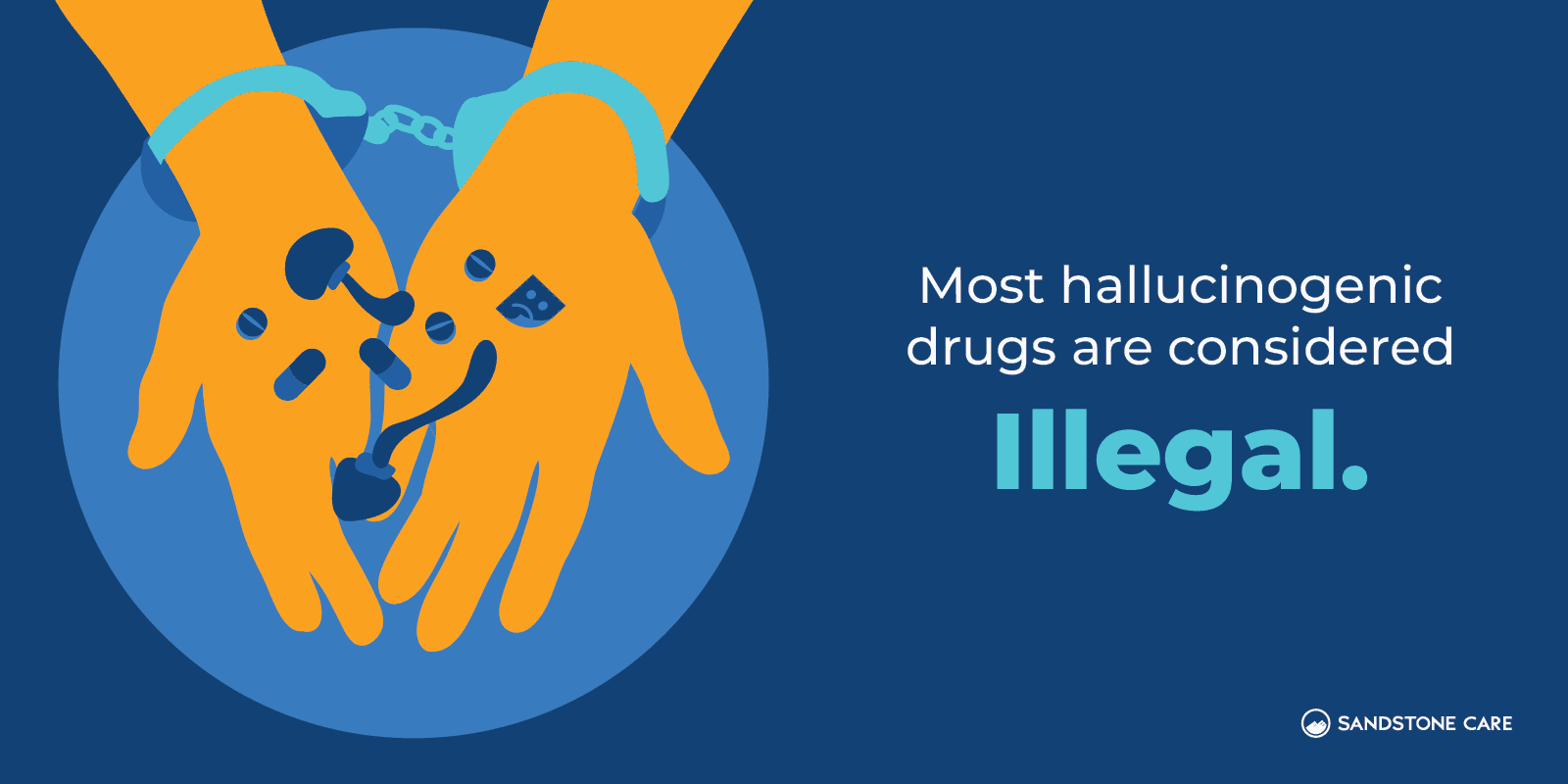
Types of Hallucinogen Drugs
What Are Some Hallucinogenic Drugs?
Hallucinogens are commonly put into two different categories: classic hallucinogens and dissociative drugs.
Both types of hallucinogens cause hallucinations and can cause sensations or images that seem real but are not. With dissociative drugs, a person may also feel out of control or disconnected from their body or the world around them.
Psychedelics (Classical Hallucinogens)
- LSD (D-lysergic acid diethylamide)
LSD is one of the most powerful mind-altering substances. Also known as acid, blotter, dots, or mellow yellow, LSD can intensify a person’s thoughts, feelings, and sensory perception. - Psilocybin mushrooms
Psilocybin comes from specific types of psilocybe mushrooms. Also known as magic mushrooms, mushrooms, or shrooms, psilocybin mushrooms are ingested orally and can make a person experience hallucinations and have difficulty telling fantasy from reality. - Tryptamines (DMT, psilocin)
Dimethyltryptamine is a powerful hallucinogenic tryptamine drug that is naturally occurring in numerous plants and animals. Psilocin can produce effects that are similar to LSD. - Phenethylamines (such as mescaline)
Also known as buttons, mesc, or peyote, mescaline comes from a small, spineless cactus. It can also be synthetic and is a naturally-occurring phenethylamine.
Dissociatives
The most well-known dissociative drugs can include:
- Ketamine
According to the DEA, ketamine is a dissociative anesthetic that also has hallucinogenic effects. Ketamine may be abused by being injected, mixing with liquids, or by powder that is snorted or smoked. - PCP
Phencyclidine (PCP) is an illicit drug that can make a person feel disconnected from their bodies, that they have superhuman strength, or that seeing, hearing, feeling, or tasting things that are not real.A person who takes PCP can become psychologically addicted to it, and taking PCP in large amounts can lead to kidney failure, heart arrhythmia, seizures, and in some cases, death, according to MedlinePlus. - DXM
Dextromethorphan (DXM) is a cough suppressor that is found in many over-the-counter cold medications.
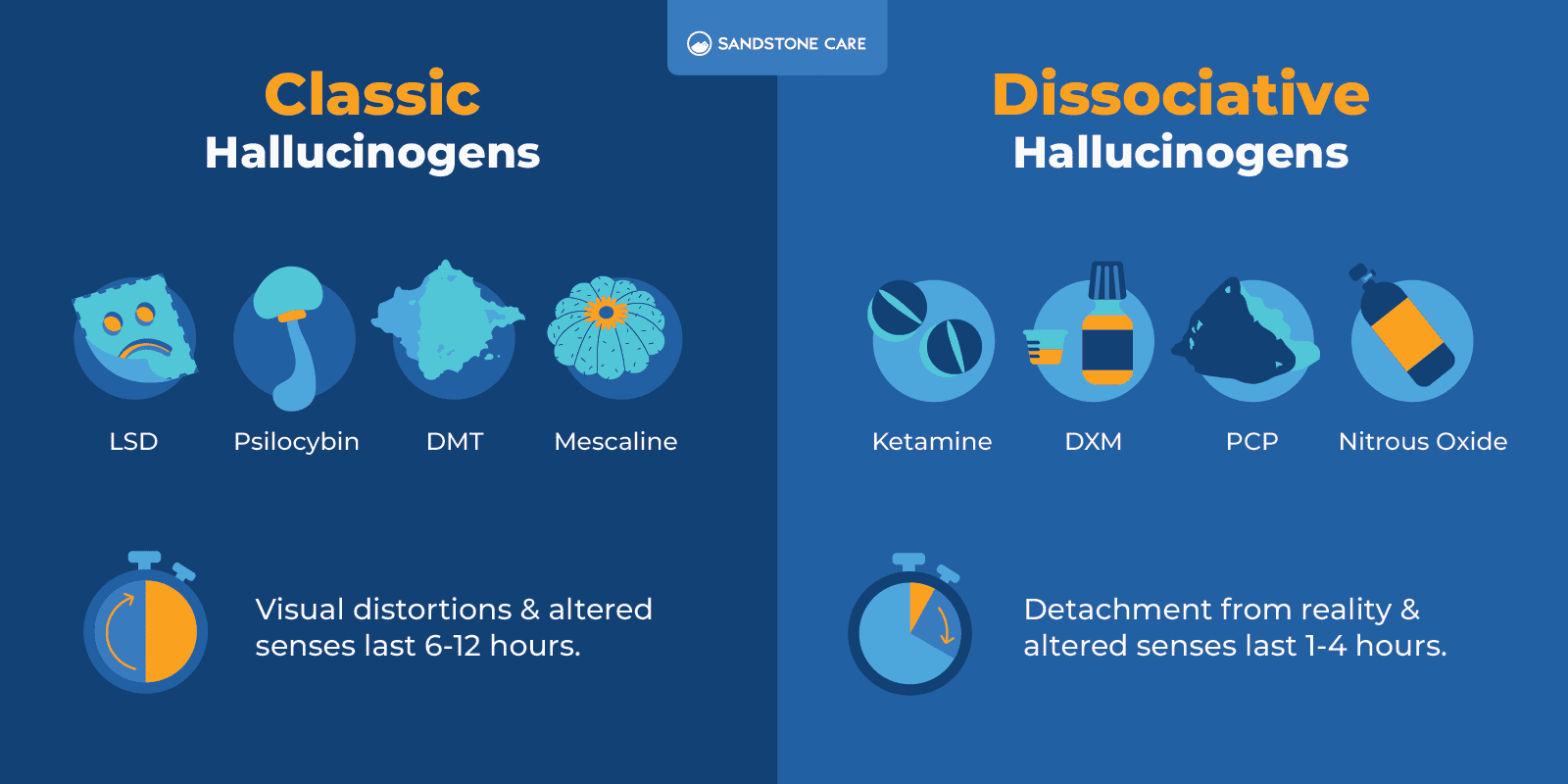
Deliriants
Deliriant hallucinogens like atropine and scopolamine can cause delirium-like hallucinations, hyperactivity, and altered affective states, according to Behavioural Brain Research.
What Plants Do Hallucinogens Come From?
Psychoactive plants that hallucinogens can come from include the peyote cactus, datura species, Salvia divinorum, and various species of morning glory.
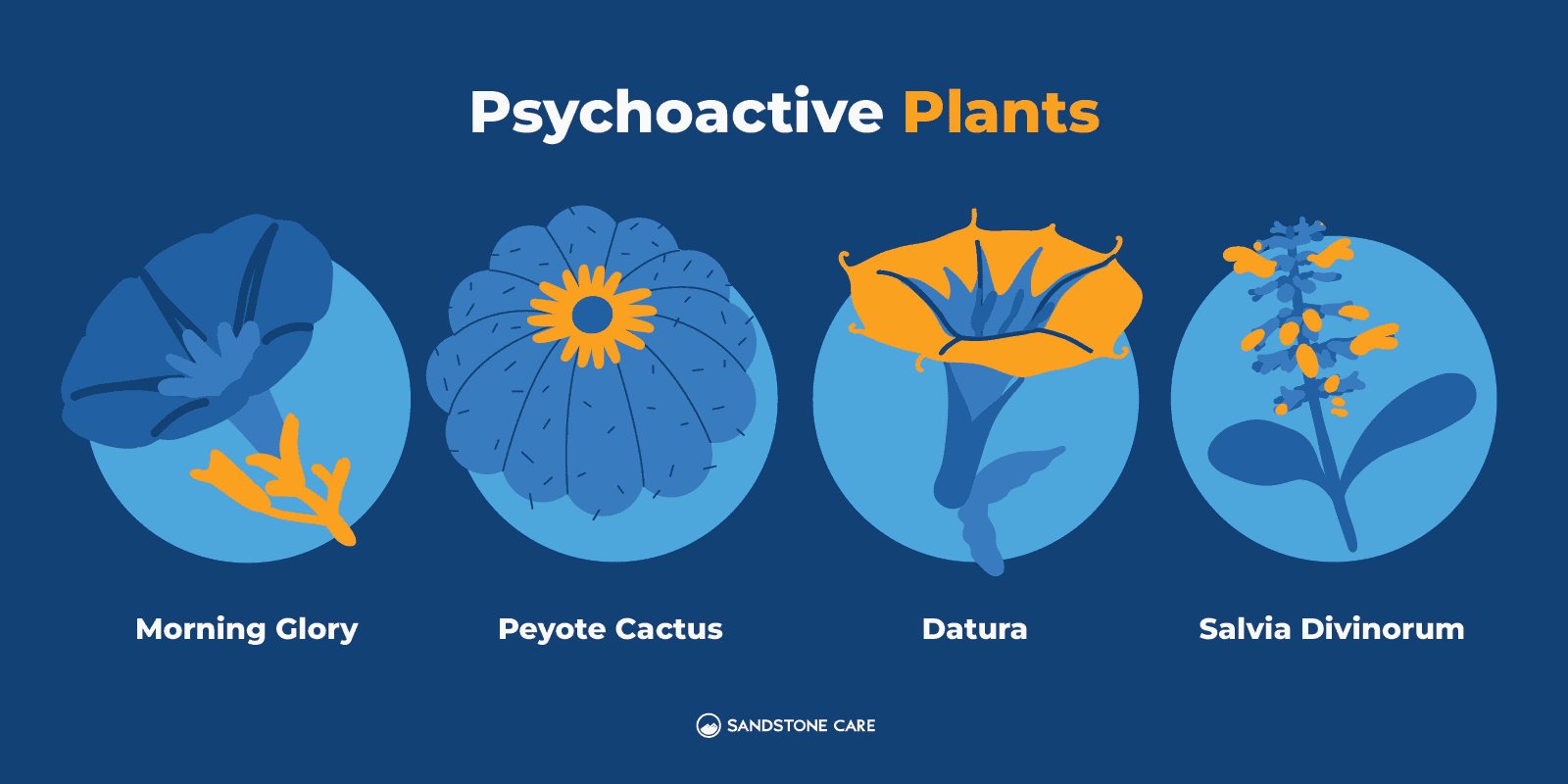
Effects of Hallucinogens
What Do Hallucinogens Feel Like?
Everyone can have different experiences with hallucinogens.
Some people refer to their drug experiences as “trips” or “bad trips” if their experience is unpleasant or distressing.
When a person is on hallucinogens, they may experience intensified feelings and feel that their perception of time is changing, like time may be moving slower.
They may start to experience physical symptoms and start to sweat, experience a faster heart rate, become nauseous, or become emotional.
With dissociative drugs, individuals may feel detached from themselves, their bodies, or their environment.
What Are the Short-Term Effects of Hallucinogens?
The effects of hallucinogens are typically felt between 20 to 90 minutes of taking them.
Some short-term effects of hallucinogens can include:
- Increased heart rate
- Nausea
- Changes in sensory perception
- Altered states of consciousness
- Emotional experiences
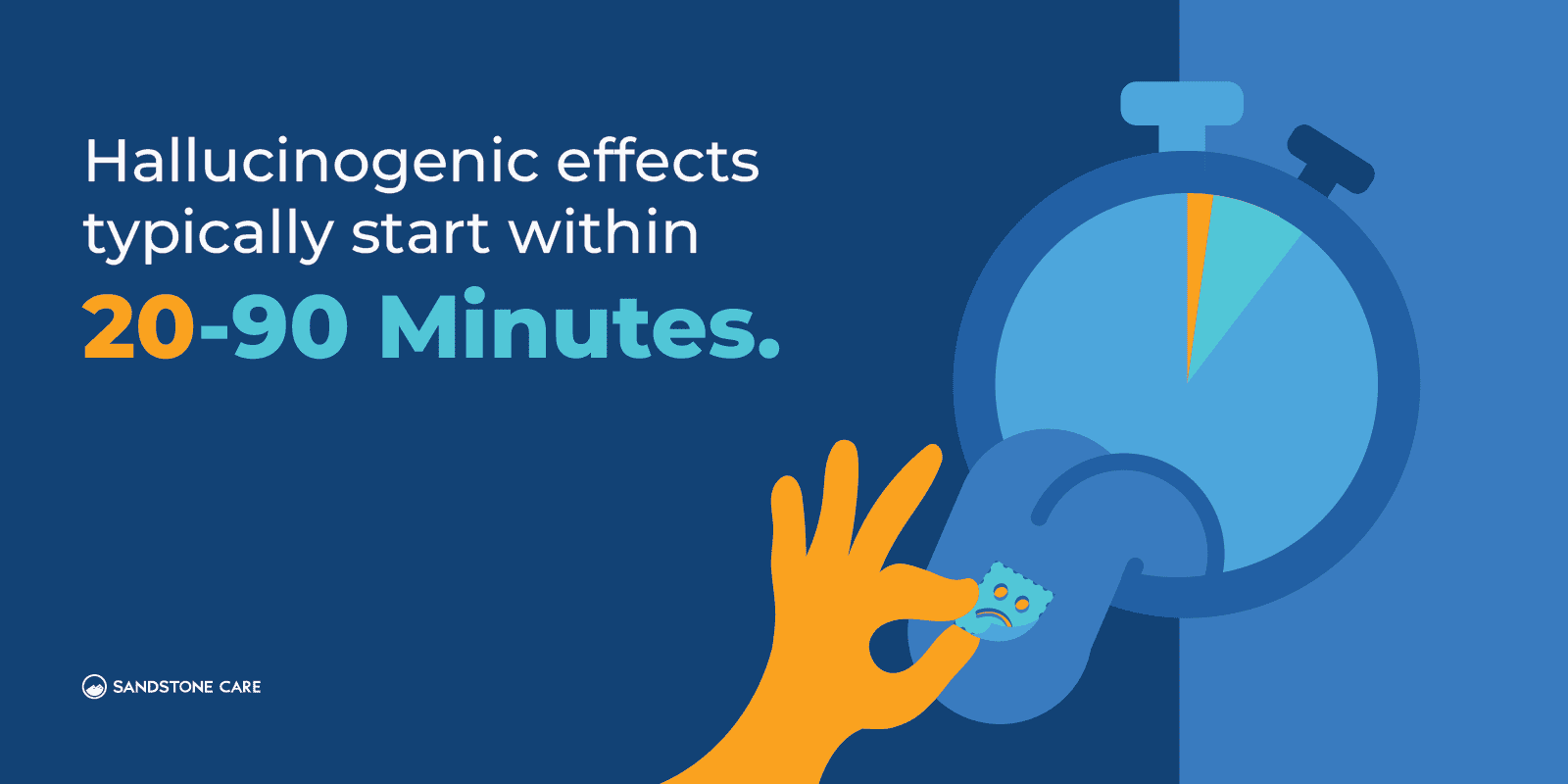
What Are the Long-Term Effects of Hallucinogens?
Hallucinogen use can also lead to long-term harmful effects, including:
1. HPPD (Hallucinogen Persisting Perception Disorder)
Hallucinogen Persisting Perception Disorder involves recurrences of drug experiences, such as hallucinations, and occurs anywhere from a few days to more than a year after drug use.
It can affect a person’s vision, where they may see blurry patterns, distorted sizes, and bright circles.
HPPD can affect a person’s quality of life and make it difficult to get through everyday tasks and responsibilities.
2. Flashbacks
A person may experience flashbacks, where they relive hallucinations of a “trip” even after they stopped taking the drug.
Sometimes, the terms “flashback” and “hallucinogen persisting perception disorder” are used interchangeably. However, flashbacks often refer to a short-term, non-distressing, spontaneous, and reversible condition.
3. Psychotic Episodes
Hallucinogen use may also lead to persistent psychosis, characterized by continuing mental health problems that often include visual disturbances, disorganized thinking, changes in mood, and paranoia.
There have been reports of persistent psychosis even after a single use of substances like MDMA/ecstasy.
What Are Some of the Physical Effects of Hallucinogens?
Some of the physical effects of hallucinogens can include:
- Increased blood pressure, breathing rate, or body temperature
- Changes in appetite
- Dry mouth
- Problems sleeping
- Uncoordinated movements
- Excessive sweating
- Panic
- Paranoia
How Do Hallucinogens Affect the Brain?
According to the National Institute on Drug Abuse (NIDA), research suggests that hallucinogens work partly by disrupting communication between systems between the brain and spinal cord.
Some hallucinogens impact the brain chemical serotonin, which regulates:
- Sensory perception
- Mood
- Sleep
- Hunger
- Body temperature
Dissociative drugs can also interrupt the action of the brain chemical glutamate, which plays an essential role in:
- The way a person perceives pain
- Responses to environment
- Learning
- Memory
- Emotions
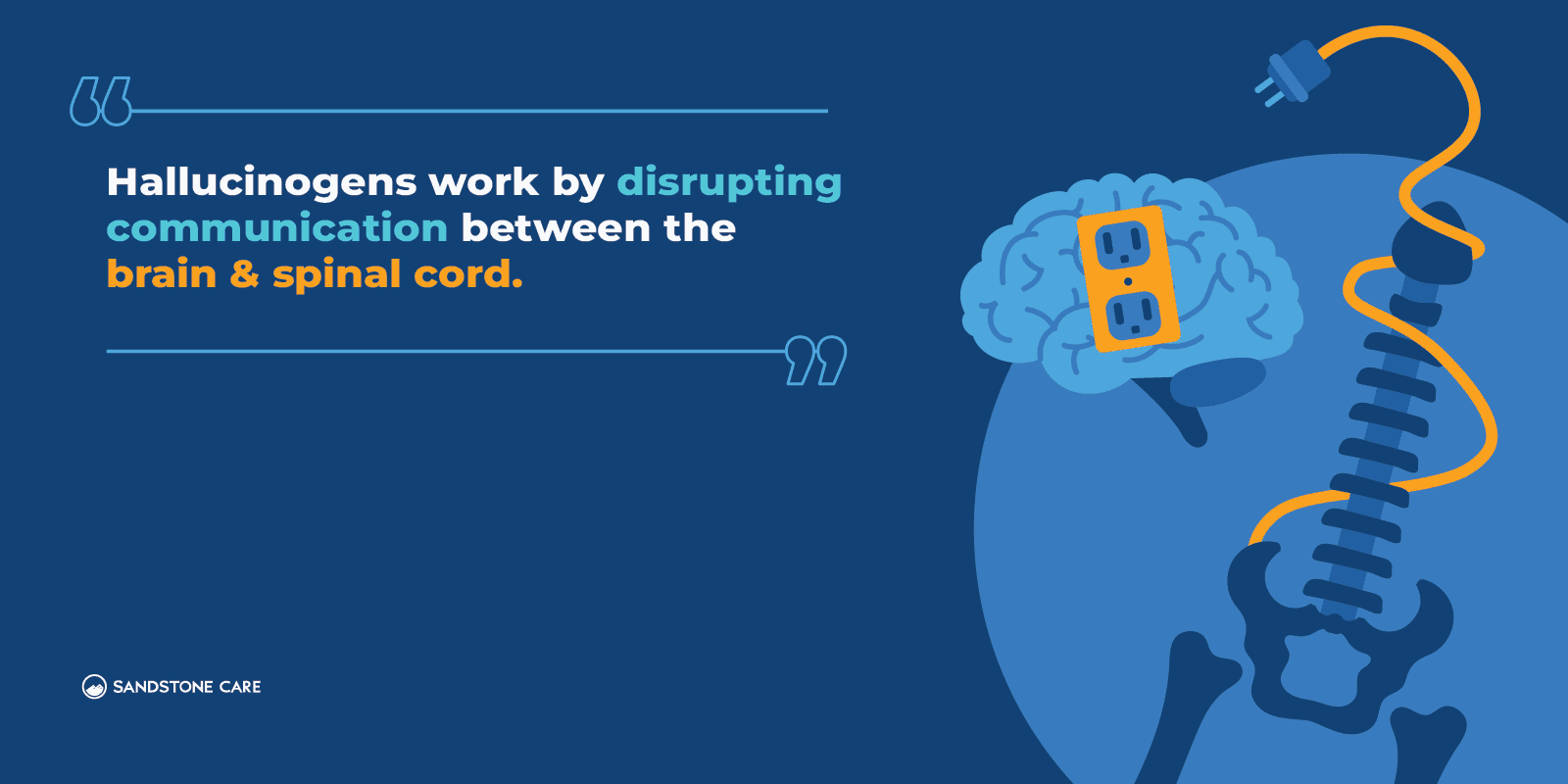
What Are the Effects of Hallucinogens on Gene Expression?
According to Current Topics In Behavioral Neurosciences, many studies have shown that psychedelics alter brain network connectivity.
Certain molecular processes initiated by hallucinogen use can also influence gene expression changes, which can lead to long-term changes in brain neurochemistry.
Hallucinogen Symptoms & Risks
Which Symptom Is Characteristic of Someone on a Hallucinogenic Drug?
Some signs and symptoms associated with hallucinogen use can include:
- Poor judgment and concentration
- Loss of coordination
- Dissociation
- Hallucination
- Mood swings
- Nausea and vomiting
- Increased heart rate and body temperature
- Altered sensory perception
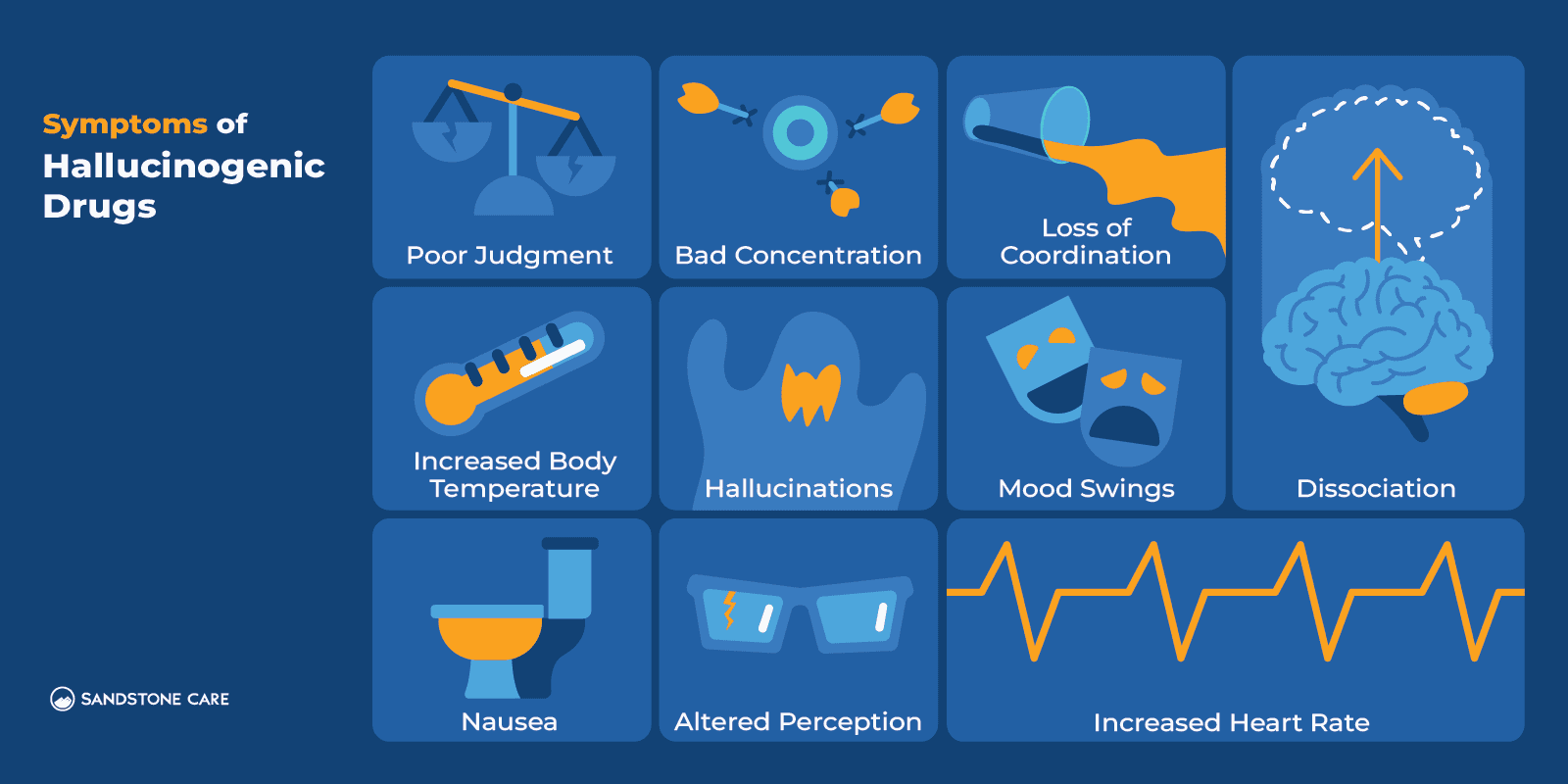
Why do Young People use Hallucinogens?
One of the wonderful things about adolescents and young adults is their innate desire to seek novelty and pleasure. This same drive can also expose them to great risks; something that we know about the way teen brains work is that it causes teens to underestimate the likeliness that they will experience negative consequences.
While it makes sense that young people would be interested in mind-altering experiences and the existential exploration that is so often associated with hallucinogens, it also can expose them to risks and experiences beyond their ability to cope. Young people may also use hallucinogens and other substances as a way of simply escaping their everyday reality.
Risks of Hallucinogens
As with all substances, hallucinogens are particularly risky for adolescents and young adults whose brains are still developing. While it is true that these powerful substances have been used as a rite of passage for many generations and across many cultures, in today’s culture youth are generally using these substances without supervision, guidance, or moderation.
The effects of hallucinogens on the developing brain are not fully understood, but they may increase the risk of triggering latent mental health concerns. Teens who use these substances can also experience a sense of boredom with their experiences while not using hallucinogens, and a sense of isolation from peers who have not experimented with these substances. When using as a way to escape an unpleasant reality, they miss opportunities to develop coping skills and genuine connection not induced by chemicals.
What Are the Risks Involved in Taking an Hallucinogen?
Hallucinogens use can come with numerous risks that can be severe and, in some cases, life-threatening.
- Risk Of Overdose And Toxicity
Hallucinogen use can come with the risk of overdose, especially with dissociative drugs.With hallucinogens and many other substances, there is also the risk of accidental poisoning from contaminants or other substances that may be mixed into the drug without the user’s knowledge.Individuals who take psilocybin mushrooms are also at risk of accidentally taking poisonous mushrooms that look similar to shrooms. These poisonous mushrooms can lead to serious illness and, in some cases, be fatal.
- Potential For Addiction And Dependence
The use of hallucinogens also comes with the risk of addiction and dependence.While some hallucinogens may not be considered to be highly addictive, like LSD, they have the potential to develop a tolerance, causing people to continuously seek higher doses of the drug to produce the same effects.Other hallucinogens, like PCP, are considered addictive and can lead to cravings, adverse effects, and other withdrawal symptoms.
- Negative Interactions With Other Substances Or Medication
Negative interactions can occur when two or more drugs or medications react to one another, resulting in adverse and potentially life-threatening effects.Mixing hallucinogens with other substances can increase a person’s risk of overdose and produce serious, unpredictable effects. - Harmful behavior
Using hallucinogens may also alter a person’s perceptions to the point where they do things that they would never do in “real life,” such as jumping off a roof. A person may also experience suicidal thoughts and act on them under the influence of hallucinogens.If you or a loved one are experiencing suicidal thoughts, call the National Suicide Lifeline at 988 or call for help at 911.
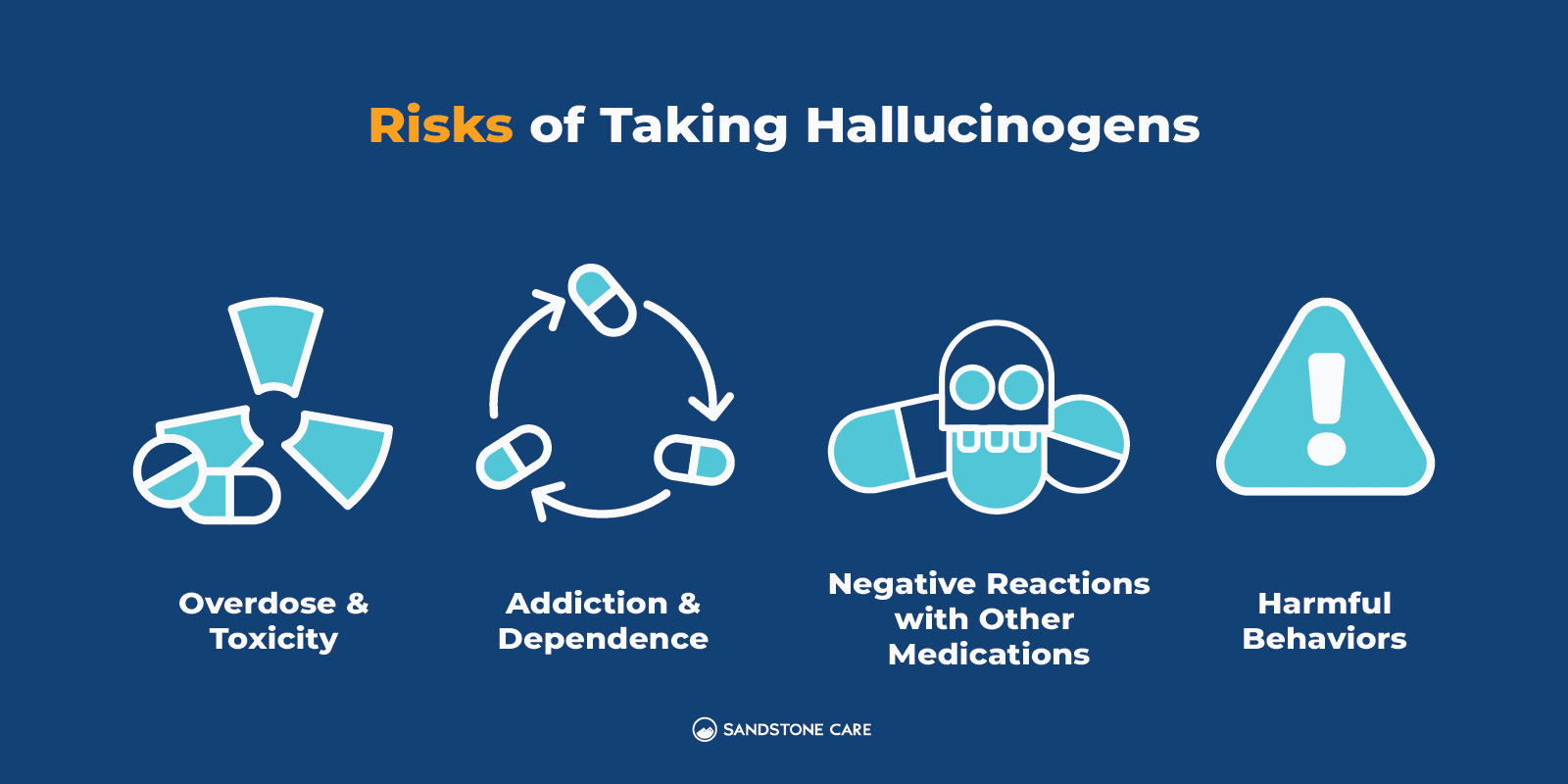
What Are the Mental Health Risks of Misusing Hallucinogens?
Hallucinogens are believed to impact neuro connectivity in the brain and impact the important brain neurotransmitter, serotonin.
Serotonin is important in regulating mood, sleeping, eating, and feelings.
Taking hallucinogens can lead to a depressed mood and disconnection, where people don’t feel like themselves anymore and experience negative feelings and mood changes.
Using hallucinogens can also put a person at risk of psychosis, which involves anxiety, flashbacks, paranoia, mood swings, and disorganized thinking.
Taking hallucinogens can not only put a person at risk of developing mental health disorders but can also worsen existing and underlying mental health conditions in a person.
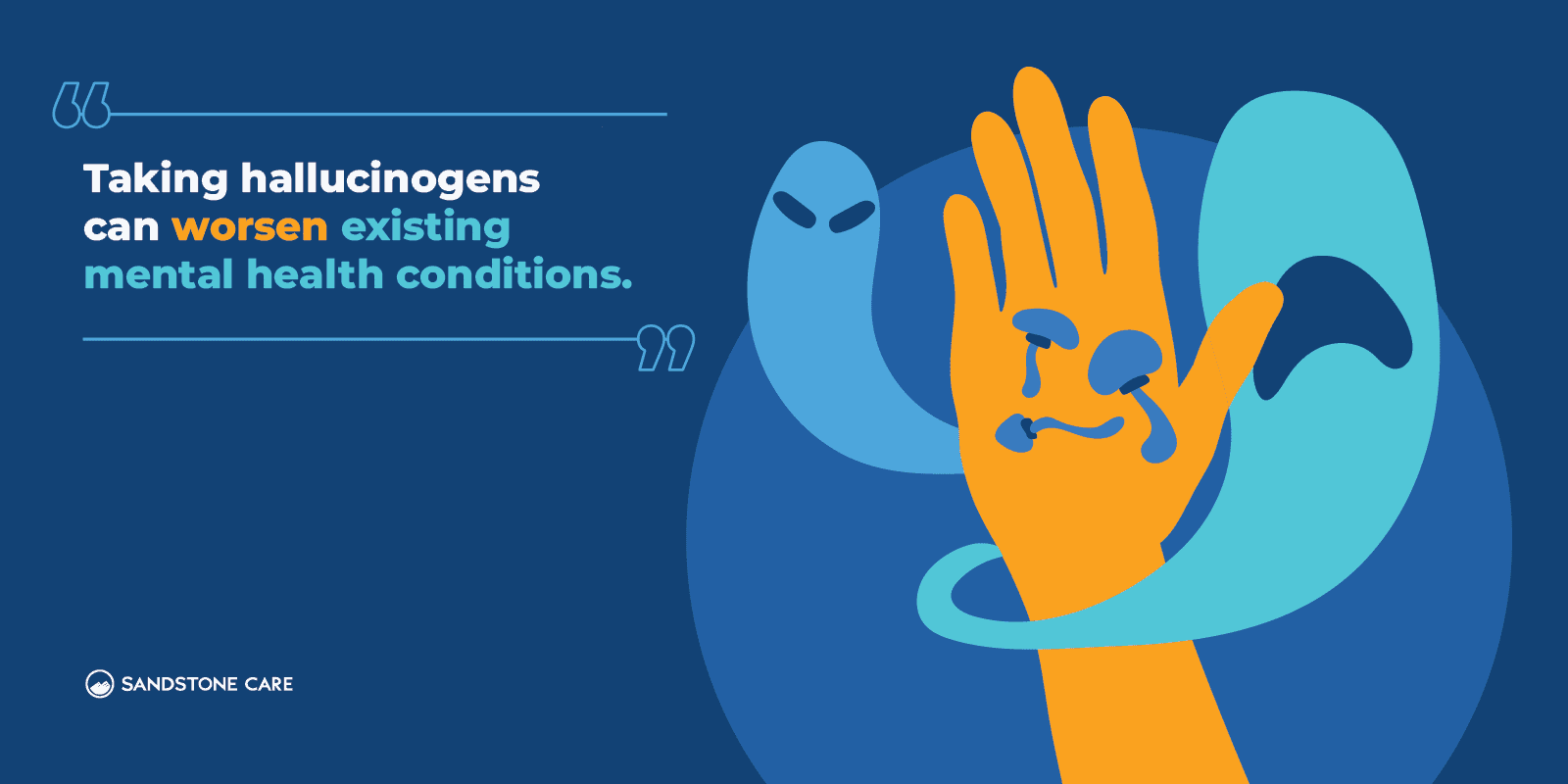
What Causes Hallucinogen Use Disorder?
Hallucinogen use disorders can be caused by a variety of different things.
Certain risks factors that put a person at higher risk of developing a hallucinogen use disorder can include:
- Personal or family history of substance abuse
- Having easy access to hallucinogens
- Personal or family history of mental illness
What Are the Symptoms of a Hallucinogen Overdose?
Symptoms of a hallucinogen overdose can include:
- Panic
- Paranoia
- Respiratory depression
- Psychosis
- Seizures
- Coma
Treatment for Hallucinogen Addiction
How Is Hallucinogen Use Disorder Diagnosed?
Hallucinogen use disorder may be diagnosed by a psychiatrist, physician, or another mental health professional.
They may gather information by asking you questions, running tests to rule out other possibilities, or having you complete a self-questionnaire.
How Do You Treat Hallucinogen Use Disorder?
There is currently no medication approved for treating hallucinogen use disorder. However, certain behavioral therapies may help manage the symptoms of hallucinogen use disorder.
What Is the Best Treatment for an Addiction to Hallucinogens?
There are currently no government-approved treatments for hallucinogen addiction.
However, psychotherapies may be helpful in treating underlying conditions that may be at the root of hallucinogen use and addiction.
Often, hallucinogen addiction treatment involves hallucinogen detox. Medically supervised detox can help a person manage withdrawal symptoms and provides a safe environment for individuals to withdraw from drugs or alcohol.
It is best to consult with your healthcare provider and a mental health professional to help you figure out the best treatment options that fit your specific needs.
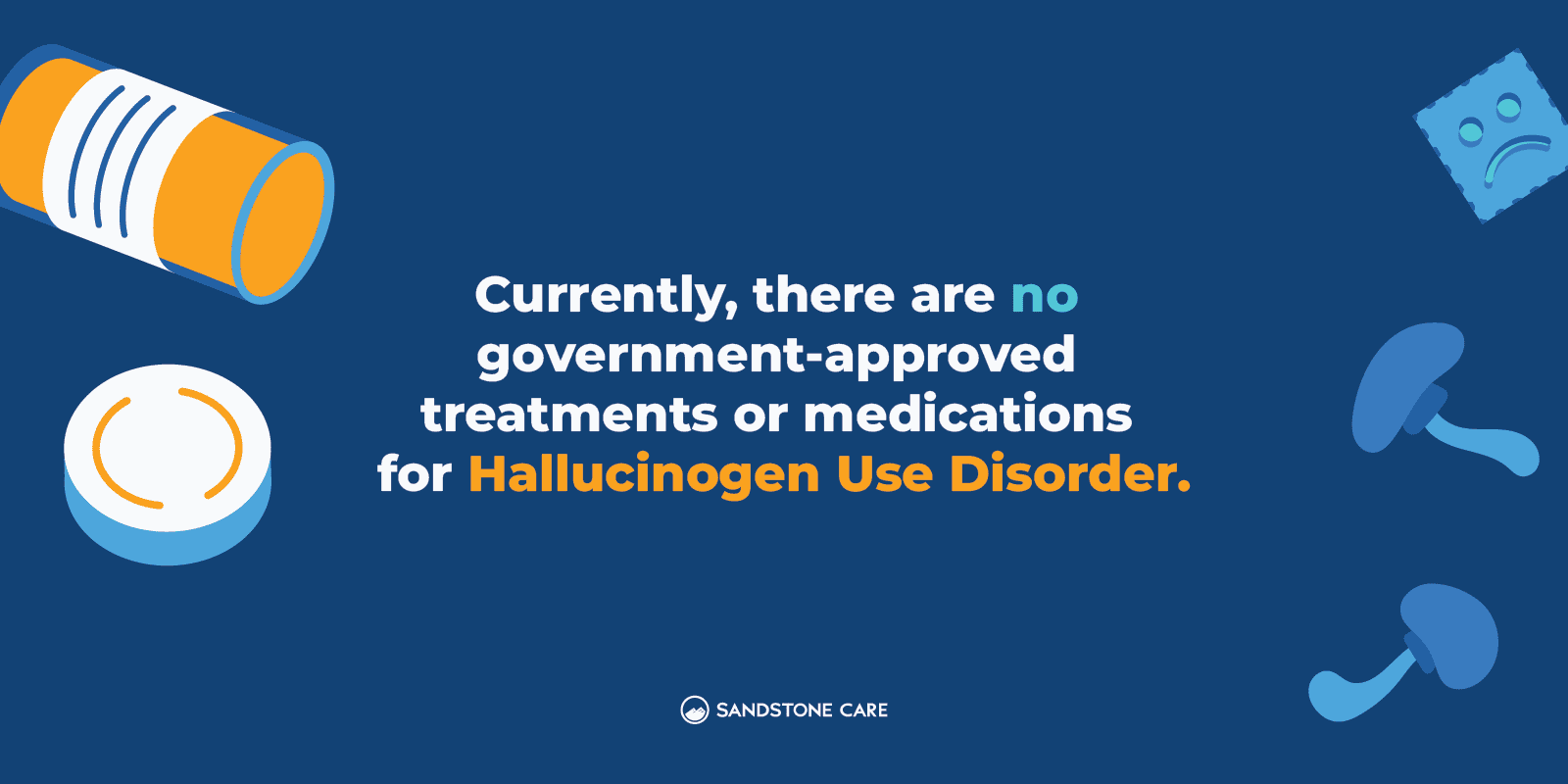
How Can You Help Yourself or Someone Else With Hallucinogen Use Disorder?
The first step in helping yourself or someone with hallucinogen use disorder is acknowledging the issue and seeking support.
You can go to someone you trust, whether it be a parent, aunt or uncle, teacher, counselor, or another adult you can confide in, and ask for help in getting connected to professional resources. You can even go directly to your healthcare provider.
Getting professional support can help give you different treatment options but also help you stop taking the substance in a safe manner.
Other ways to help yourself or someone else with hallucinogen use disorder is by practicing healthy habits and coping mechanisms.
Some people turn to substance abuse to cope or self-medicate with difficult feelings and situations. However, these habits only lead to a negative cycle that can cause serious harm to a person’s health and life.
Getting physical exercise, going outside, practicing self-care, and practicing mindfulness, can all help a person heal and cope in healthy ways.
Know that you are not alone and that there is support for you. Reaching out for help can be hard, but it is necessary for healing for you and your well-being.
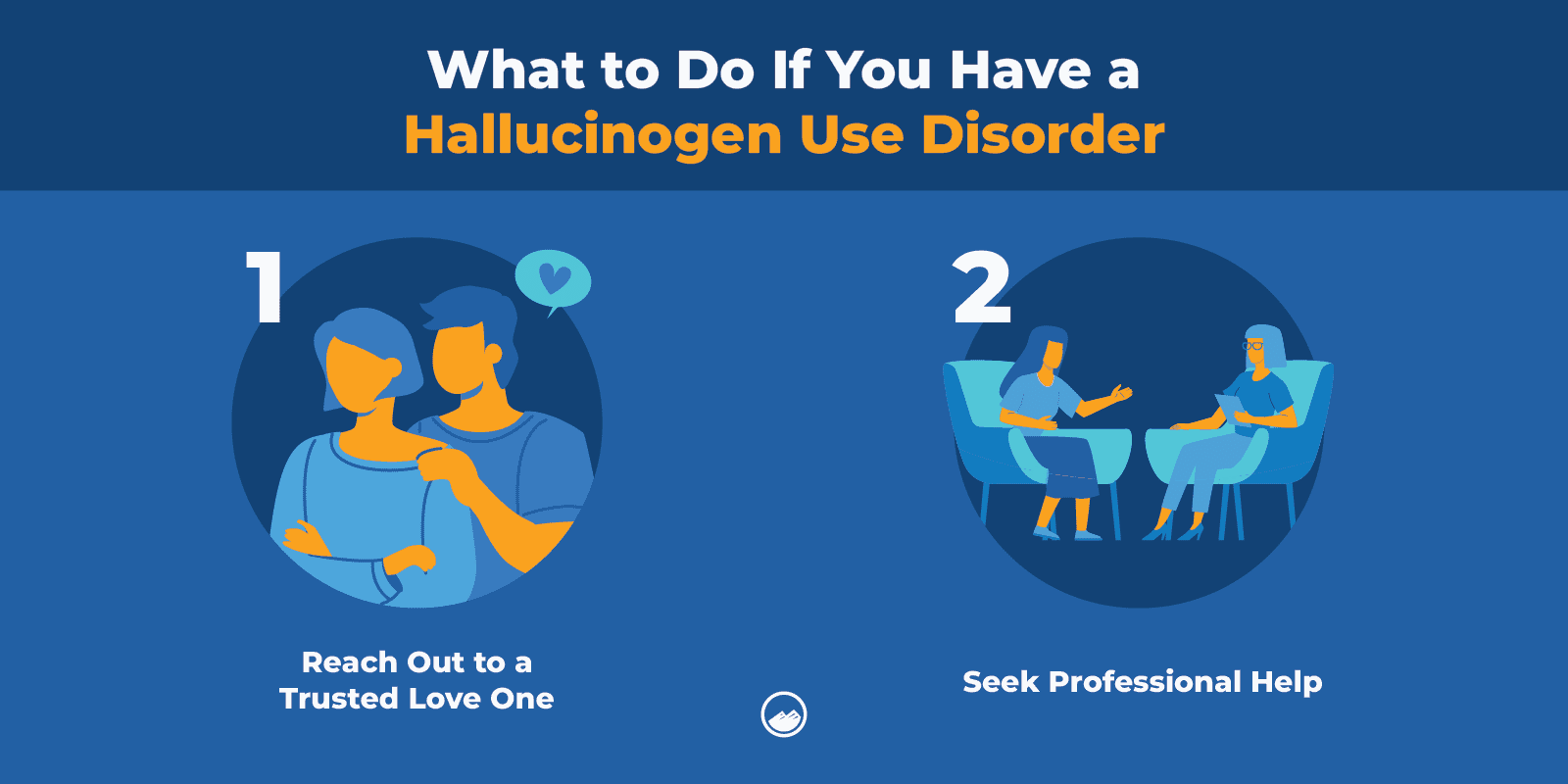
FAQ
You Have Questions, We Have Answers.
Our goal is to provide the most helpful information. Please reach out to us if you have any additional questions. We are here to help in any way we can.
Hallucinogens are also often referred to as psychedelics.
Psychedelics are a group of substances that alter a person’s perception, mood, and cognitive functions.
Lysergic acid diethylamide (LSD) is one of the most popular, well-known, and commonly used psychedelics.
LSD has been abused since the 1960s for its hallucinogenic effects, and while it may not be highly addictive, it can lead to compulsive drug-seeking behavior and tolerance, causing users to seek higher doses of the drug to produce the same effects.
LSD is considered one of the most potent psychedelic substances.
When compared to other hallucinogenic substances, LSD is believed to be 100 times more potent than psilocybin and 4,000 times more potent than mescaline.
However, other strong hallucinogens can include DMT, mescaline, salvia, and MDMA.
It is important to note that hallucinogens can affect each individual differently. Even if one is not considered one of the most potent hallucinogens, it can still cause serious, harmful effects.
Marijuana is known to be a hallucinogen, yet it also has stimulant and depressant effects.


Let’s take the next steps together
Hallucinogens are a group of substances that can alter a person’s perceptions, and can come with serious and harmful effects. Sandstone Care is here to support teens and young adults with mental health and substance use disorders



